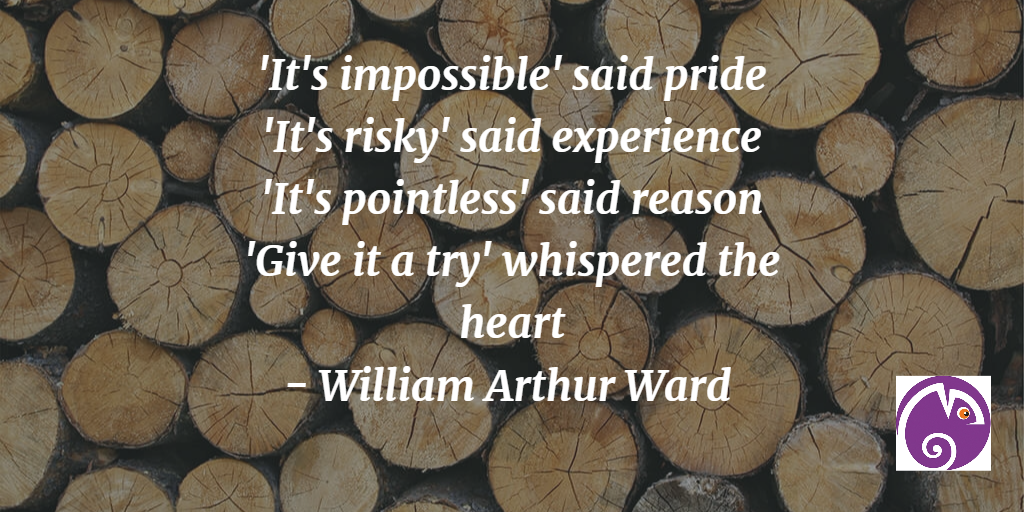
How to grow your business - taking on people
Karen Espley
The Chameleon Guide.

Karen Espley
The Chameleon Guide.
Hands up if you want your business to grow profitably allowing you to live the life you dreamed of when you first started off on this great adventure called entrepreneurship?
If you didn't put your hand up, then stop reading now and go do something more fun.
For those of you with your hands up, you can put them down now, and hurrah! To me, the ultimate aim of my business is to have one that I've built on my terms, doing it my way and to be proud of what I've achieved.
One of the ways to do this is to create a sellable business, even if you don’t actually want to sell it.
Why is this? Because the actions you take to create a company that someone else wants to buy creates a business that works for you and creates profits. All this without you having to flog yourself into the ground every day. Sounds good doesn’t it?
My e-book - 'How to grow your business in seven short(ish) steps' looks at what these actions are and gives you ideas for you to implement.
The seven areas I cover in the book are:
I use ‘customer’ and ‘client’ interchangeably throughout the book as some of you have customers and others have clients.
This is the chapter on growing your business beyond just you. It's the most challenging area for a small business owner. At what point do you take on more staff, how do you afford to do it and can you cope with the pressure of having more people involved?
Before you can grow, you need to be crystal clear about your service/product offerings and the chapter starts off by giving you suggestions on how to work that out. It may be you already have a very clear niche, but it's a worthwhile exercise to do - you might find it quite illuminating.
As an aside, I would highly recommend that you read Michael Gerber’s The E-myth Revisited if you haven’t already. It’s a great book for talking about having the end in mind.
Without further ado, let’s begin.
I hope you enjoy it and find plenty of useful actions to take that will really help you grow your business.

How able is your business to scale or grow now or in the future? If you suddenly got a mass of clients tomorrow, how would you manage? Do you have a plan in place?
The key to scaling your business is to have products or services that:
It’s possible to score your products and services against the three factors above to help identify any that might be more profitable than others. They are the ones that you think you can train someone to deliver, that give you alot of repeat business and are the most profitable and bought by your ideal client.
Let’s look at an example of how this might work using a photography company who went through this exercise.
Most photographers that I have come across rely heavily on the owner and tend to offer the whole range of photography services from family photos, to business shots, to events and weddings.
This photographer offered three types of photography – Wedding photos, school photos and football club photos.
If we take each in turn and score them out of 10 against the three factors above:
Weddings:
Can you teach someone to take wedding photos? Generally yes. There are a certain number of standard poses that weddings look for such as group photos, pictures of the bride and groom in pretty places, wedding speeches and so on. So let’s give this a score of 7 out of 10.
Is wedding photography valuable? Heck yes. Any product or service that involves the word ‘wedding’ is a licence to print money. So this gets a high score of 9 out of 10.
Is it likely to generate repeat business? Unless you’re Zsa Zsa Gabor (rest her soul) and are planning multiple weddings, then the answer is no. You may get referrals off it, but generally, you are unlikely to get repeat business from that client. So that gets a low score.
Football teams:
Football photography is very easy to teach someone else to do. There will be team shots and possibly individual shots and that’s pretty much it. So it gets
a high score of 9.
It’s not really very valuable business though, as the clients are likely to be local football clubs who don’t have much in the way of budget, so they will be looking for bargain basement prices. So this gets a low score.
However, it is highly repeatable business as each season there will be new teams that need photographing, so it gets a high score.
School photos:
Like football photography it’s easy to take school pictures. There are likely to be class photos and individual or sibling photos. They are generally a pretty standard format, making it very easy to teach someone else to take these pictures.
Is it valuable business? Whilst not as valuable as wedding photography, it’s still pretty good money. Parents will pay good money to have lovely pictures of their children.
And it’s highly repeatable business as you get to go back every year to mark the change in years. My brother’s fireplace is testament to this – there are photos on the mantelpiece of my nephews from every year.
If you add up the scores, it became obvious that school photography was the way forward (see the table below).
| Product/service | Teachable | Valuable | Repeatable | Total |
| Weddings | 7 | 9 | 0 | 16 |
| Football | 9 | 3 | 9 | 21 |
| School photos | 9 | 9 | 9 | 27 |
This particular company took the bull by the horns in a Del Boy Trotter ‘Who dares wins Rodney’ way and streamlined their business so all they did was school photography. They changed their website and now that’s all they do. They’ve expanded the product range to include mugs, mousemats and calendars for example.
The aim of this is to focus on fewer things you offer and do them really well rather than offering everything - see chapter 8 on creating a niche.
Why not have a go at doing this with your products and services and see if anything pops out that could help you identify areas of your business that could help you grow? And more importantly, that you might consider dropping as service offerings...
Having done that - what do you do next?
If you have decided that you can train others to do some of your specialised work, you need to have a plan for how you might get someone on board to do that. And of course the big challenge for small business owners is having the funds to be able to afford to take someone on.
So what can you do? Listed below, in increasing cost, are some suggestions you can look at.
Free resources
- Is there anyone who might be prepared to help you for free such as a university student who is studying in that area of expertise, or someone who wants to build up experience? This isn't as daft as it sounds. I know the owner of Surrey Hills Brewery. He used to be in IT at Standard Life, but his passion was brewing beer. He left to set up his brewing business. But before then he contacted a few micro brewers who allowed him to come and work with them so he could learn the business from the inside. He worked in several places for free, but in exchange got a wealth of experience which helped him when he set up the business. Which is now thriving.
Or another client was contacted by a marketing intern looking for some business experience and who did some market research and other time consuming tasks that freed up the owners to concentrate on other business building activities.
Another client uses his daughter to make phone calls one day a week to his clients to keep in touch with them. She's brilliant at it and has generated some great results for him. Again, it frees him up to do other business
generation activities.
Outsourcing
One of the keys to growing is to free up your time to spend on growing your business. If you're spending your time doing your invoicing, or putting your business cards into a CRM system, whilst you might feel you've had a busy old day, it's not moving your business forward.
There are plenty of people out there who have the skills to support you in your business growth, without it costing you a fortune.
I use a VA (virtual assistant) to run my Twitter feed for me and to do other tasks such as posting blogs and newsletters for me and inputting my business cards into my CRM. Not only does this free me up, but she also acts as a good sounding board when she spots my mistakes (as if!).
Identify all the areas of your business that are distracting you from doing what you need to do to grow. These include at a minimum: your accounts, invoicing, inputting receipts, managing your CRM or doing your social media posts. Other more involved activities include getting people to write your blogs for you, arranging your meetings, managing your diary or doing outbound sales calls.
I have a handy checklist of things you might want to look at outsourcing. If you'd like it please email me at karen@thechameleonguide.com.
What one of my clients did was every time he did something that he thought could be outsourced was write it on a post it note and stick it on the wall. Result: he started using a VA to help with some of the tasks.
The beauty of outsourcing is that you can use it to try and see how much others can help you without having to take them on full time.
You can build yourself a virtual team ready for the future.
Apprentices
This is another more affordable option, though requires more input. Not all disciplines are covered by apprenticeships and even if they are, you might not fit all the criteria that they need to cover. Nonetheless, it's worth looking into.
The goverment website has some useful information - click here
Jace Training has a fantastic download which explains Apprenticeships really well
Employing staff
This is probably the most challenging area for a small business owner who is constrained by cash flow.
A general rule of thumb is that you should expect the person you take on to be generating double the revenue of what you pay them. So if you pay someone £20k a year, you would expect your revenues to go up by £40k. This may be directly e.g. they make sales calls for you. Or you might have to look at it from the point of view that the work they are doing frees you up to spend more time on sales for example.
It may be that you have the potential to grow your business if you only had staff on board, but you can't afford it. It might be time to consider getting a loan. For this you will need a business plan. I can help with this.
See also - Chapter 7 - for more information on employing staff
See also Chapter 8 – having a niche.
| Actions |
| 1. Look at your products and services and identify for each how teachable, valuable and repeatable they are and score them. 2. Is there a pattern which might suggest a streamlining of your products or services? 3. From this - are there products/services that you can train someone else to do to help you start growing? 4. Look at how you might be able to get additional resource to help you - from either getting someone to help you out on a part-time basis through to employing people. |

There is a lot to involved in growing your business! But don’t get overwhelmed and decide not to do any of it.
One of my favourite sayings from the US Army Seals is ‘How do you eat an elephant? One bite at a time’. And that’s what you need to do here.
Pick one action and work through that. And then pick another.
Before you decide on adding more people to your business I would strongly recommend you come up with a plan containing the vision for your company, who your target market is and work out your sales targets.
There is a lot of help out there – it’s hard to do this by yourself and some of it may feel too challenging or difficult so look for some help such as:
If you want a plan and accountability, someone to help you move forward and make sure you take your actions, I can provide that in spades.
I run regular planning workshops which will not only help you get clear about your strategy and target clients, but also help you create a 90 day action plan.
If you’d like to know more and the dates for future workshops, then please email me karen@thechameleonguide.com
I also run mastermind groups and I’m starting a new one in the new year – for more information click here - Mastermind Groups or drop me an email for a chat.
Other really excellent people who can help you include:
| Area of business | Name & Business | Email | Website |
| Selling and mindset | Nicci Bonfanti Trusted Sales Dynamics | Nicci@trustedsalesdynamics.com | http://trustedsalesdynamics.com |
| Marketing | Nicola Macdonald Attractive Marketing | nicola@attractivemarketing.biz | www.attractivemarketing.biz/ |
| Getting your on-line tools to work for you | Julia Elgar Just Ask Julia | julia@justaskjulia.co.uk | www.justaskjulia.co.uk/ |
| Copywriting/ Blogs/Newsletters | Lucy Pitts Strood Copy | lucy@stroodcopy.co.uk | http://www.stroodcopy.com/ |
| Book-keeping | Terry Peers Crocus Books | terry@crocusbooks.co.uk | www.crocusbooks.co.uk |
| Payroll | Sam Millard Greengages Payroll Bureau | sam@greengages.co.uk | www.greengages.co.uk/ |
| HR | Jane Blackwood HR Business Consultants | jane.blackwood@hrbuscons.co.uk | http://www.hrbuscons.co.uk/ |
| Recruiting - How to recruit the right people | Ali Waters The Recruitment Team | aliwaters@therecruitmentteam.co | www.therecruitmentteam.co/ |
I wish you all the very best in your business journey. Be brave, be bold and above all, have a blast doing it.
I’d love to hear your feedback and if there are other subject areas you’d like to learn about.
Email me at karen@thechameleonguide.com

I started my life in the corporate world working in health insurance for 15 years. And so began what I consider to be my business apprenticeship.
I started off as a humble admin assistant (filing, spreadsheets, photocopying, general whatever needed doing I'd do). I rapidly got promoted through the ranks, including managing a claims department of 100 people, running a Provider Services team, negotiating contracts with large hospital groups to being the business manager responsible for delivering a £12million IT project which completely changed how we worked.
Wanting to expand my knowledge of how business worked outside of health insurance I completed an MBA whilst working full time. My salary doubled from when I started to when I finished it three years later. Not because
my bosses suddenly realised how amazing I was, but because what I had learned gave me the courage to go for jobs that I previously wouldn't have dared apply for.
In 2000 I cut free of the corporate world and went freelance. This was so interesting and I got to do a whole range of different consulting pieces with companies in different industry sectors. These included a private clinic, an outdoor adventure company and a healthcare brokerage.
As part of my freelancing I joined a small software testing consultancy in the city of London at the end of 2000 and with my back office skills, I helped them grow. And then supported them through sales process once we reached 150 employees. After the sale went through they tempted me back to the dark side of employment with the role of Marketing Director.
When I left them in 2008 I went back to consulting and then became a director and shareholder of a fledgling software testing consultancy as the Marketing/Ops/HR director. This was very successful and at one stage we had nearly 30 billable consultants - which was pretty good going in less than 18 months! Unfortunately due to circumstances beyond our control, we had to sell an otherwise thriving business and with my background I was not needed by the much larger organisation that bought us and I (very sadly) exited stage left to seek horizons new.
And in a long, roundabout way partly explains why I now work with small businesses.
I have learned the disciplines of the large corporates, worked for start-ups, been in business that have failed, been in a business that grew from nothing to over 200 employees and got bought, worked freelance and now have my own business.
I have learned a lot along the way. Some of it rather painfully.
When I came back from my mid-life crisis travels at the end of 2013 (see below), I started helping a few friends who were setting up their businesses
and who had asked for some advice and support from me. With my broad experience of running back office functions and management I was able to bring some structure and direction to their businesses, getting them off to the best start.
I realised I really enjoyed helping them (and part of the reason I went into nursing - I really like helping people). And it turns out the way I can help people is to help them run their businesses well. I bring order to chaos and a lot of accountability.
I have moments of madness which leads me to do things that others may consider bonkers.
In 2000 I went to the Antarctic (care of Standard Life, who I can't thank enough for what was the best experience of my life) and lived on a Russian base for three weeks. If anyone would like to book me for a talk on my trip, I would be delighted to share it and some amazing photos with you - I can wax lyrical on the subject for hours!
Having loved my trip to the Antarctic so much, I signed up to do Raleigh International (or Operation Raleigh as it then was) in 2001. I ended up in a rainforest, in the back end of Ghana, project managing the build of an environmental centre to raise money to help prevent illegal logging. Whilst managing groups of 18-22 year olds, some in their gap yahr, others who were from a youth at risk programme and local venturers. Trying to encourage them to be self managing, building a centre whilst at the same time living in a rain forest clearing miles from anywhere with no light or electricity or communication to the outside world. This was before smart phones!!
Having survived three months of that, four of us then decided to travel back to the UK through West Africa using public transport. If any of you ever get the feeling that this is what you want to do, please don't!! It has to be the most bonkers and mad thing I have ever done. You couldn't do it now. Well I suppose you could, but it would be rather more hazardous these days. That's not to say it wasn't hazardous then, but in completely different ways.
I'm available to talk on this too if you're up for tales of lunacy and ill advised shenanigans.
In 2013, I rented out my flat in London and flew to New Zealand and Australia via Bali and spent several months in a campervan wandering around the north island of NZ before heading to Australia where I drove, flew, sailed and campervanned my way round. All of which seems rather tame in comparison to West Africa and the Antarctic, but it's an intersting challenge when you're 50 and travelling on your own. The blog on my whole trip can be found here
I reckon I'm safe from another bout of travelling/jumping off the work wagon for another eight years!